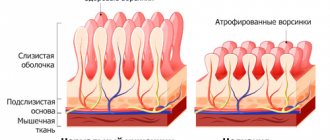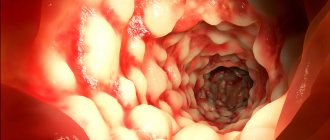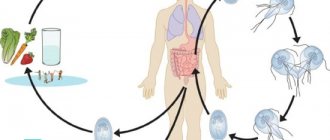Inflammation of the stomach is one of the most common diseases. It is this pathology that becomes the main cause of the appearance of many other diseases of the gastrointestinal tract. Only a gastroenterologist can confirm the symptoms of gastritis and begin treatment in adults after a full diagnosis.
If pain in the epigastric area and other signs of pathology appear, it is recommended not to delay and consult a doctor. Only early detection of the disease will help stop its further development.
What is gastritis?
Many people do not fully understand what gastritis is. This disease is an acute or chronic inflammation of the mucous membrane of an organ, which begins to deteriorate over time.
This can happen for various reasons. Most often, it is the low or high acidity of the stomach that affects the destruction of the lining tissue. After each meal, a person is bothered by pain in the epigastric region, which occurs as a result of affecting the nerve endings of the digestive organ.
The pathology is characterized by the ability to progress rapidly without taking medications or following a therapeutic diet.
Signs of gastritis of the stomach with high acidity
This is an inflammation of the gastric mucosa, due to the pathology of the functioning of the secretion of gastric juice. With increased acidity (hyperacidity), patients note pain only during exacerbation of the disease.
Gastritis with high acidity is manifested by a feeling of heaviness in the stomach, the pain is moderate and not acute. Symptoms often begin after eating. There may be hunger pain that is more intense than the first one. When the intestines are involved in the disease process, patients suffer from constipation, the pain becomes widespread, spreading to the entire abdominal region. The functioning of the entire digestive tract of the patient’s body is disrupted. Dyspepsia appears: heartburn, sour belching, nausea, unpleasant taste in the mouth.
Signs of gastritis with high acidity are characterized by alternating exacerbations and remissions, but without pronounced seasonality. At the initial stage, the symptoms are mild and hardly noticeable to the patient.
The causes of gastritis of the stomach are varied, including smoking, abuse of hot and too spicy foods, and alcoholism. The patient's genetic predisposition cannot be ruled out. Most often, hyperacidity affects young people who eat dry food, out of breath with sandwiches, hot dogs and washing everything down with Coca-Cola. Smoking has a very bad effect on the stomach, especially on an empty stomach, on an empty stomach.
In modern medicine, they are not inclined to diagnose gastritis with high or low acidity and prescribe strict diets, and everyone blames everything on the Helicobacter bacterium. Treatment here is aimed at destroying Helicobacter with antibiotics.
Helicobacter pylori (dark, small rods) on the surface of epithelial cells
Helicobacter pylori is a spiral-shaped gram-negative bacterium that infects various areas of the stomach and duodenum.
Many cases of gastric and duodenal ulcers, gastritis, duodenitis, and possibly some cases of lymphoma and cancer are etiologically associated with Helicobacter pylori infection. However, the majority (up to 90%) of infected Helicobacter pylori carriers do not show any symptoms of disease. The spiral shape of the bacterium, from which the generic name Helicobacter is derived, is believed to determine the ability of this microorganism to penetrate the mucous membrane of the stomach and duodenum and facilitate the movement of the bacterium in the mucous gel covering the mucosa.…Wikipedia article on Helicobacter pylori
Now there are three types with high acidity
| Gastritis with high acidity | Cause |
| Gastritis type A | Genetic predisposition |
| Gastritis B | Helicobacter bacteria |
| Gastritis type C | Action of chemical reagents |
The cause may be reflux , which is caused by a hiatal hernia, an overfilled stomach, or pressure inside the abdominal fat on the contents of the abdomen. A common symptom of the disease is heartburn.
Causes of gastritis
There are many factors that contribute to the occurrence of gastritis in humans. Most often, these are external causes, that is, destruction of the gastric mucosa appears due to the patient’s regular incorrect actions. But sometimes the disease develops due to exposure to internal triggers, which is much more dangerous.
External reasons:
- poor nutrition;
- regular stress;
- parasitic, infectious or bacterial damage to the digestive system;
- burn of the stomach by a chemical substance;
- improper use of medications;
- use of drugs, alcohol and cigarettes;
- dental problems;
- peritoneal injury.
Internal reasons:
- congenital defects of the digestive system;
- hereditary predisposition to the disease;
- autoimmune disorders.
Whatever the cause of gastritis, it must be eliminated first and only then treatment begin. Otherwise, the disease will return again in an even more severe form.
Types of gastritis
Gastritis, depending on its type, as well as the stage of the disease, manifests itself in different ways. Inflammation of the stomach can develop either gradually, due to a systematic unhealthy diet and other factors, or very quickly, due to rough effects on its walls.
Acute inflammation of gastritis can be caused by poisoning (chemical and food), a sudden release of bile into the stomach, gastrointestinal infections, side effects from toxic drugs, etc.
Depending on the cause of gastritis, as well as the type of inflammation (it can be catarrhal, fibrinous, necrotic, phlegmonous), its manifestations will differ.
The intensity of the pain also differs: for example, with phlegmonous gastritis, the stomach hurts very much, because the pain is caused by traumatic damage to the walls of the stomach.
READ Treatment method for hypertrophic gastritis
Catarrhal gastritis occurs much more easily, which is usually caused by harmless food poisoning or poor nutrition.
Fibrinous and necrotic gastritis are considered very serious and require immediate medical attention - they are caused by poisoning with alkalis, acids and other chemicals.
Depending on the type of gastritis, symptoms and treatment in adults will differ.
That is why doctors conduct a detailed examination of the organ before deciding which pills to choose or other methods to treat this disease.
The causes of gastritis, in addition to those listed, may be the following:
- systematic use of alcohol. It leads to a disruption of the acid-base balance and an increase in the amount of alkali in the organ;
- long-term use of non-steroidal anti-inflammatory drugs. These include most medications sold without a prescription. Non-steroidal drugs include many antipyretics, painkillers, tablets against hypertension and many other diseases;
- removal of part of the stomach.
Sometimes the cause of stomach inflammation cannot be determined - doctors call this type of disease gastritis of unknown origin.
In addition to the cause of origin, doctors also use other ways to classify the disease, for example, by type of spread.
In this classification, the following types of gastritis are distinguished:
- autoimmune;
- exogenous;
- mixed;
- type C (caused by chemicals or bile);
- special shape;
- with increased or decreased secretion of hydrochloric acid;
- other forms of functional manifestations.
It is possible to identify the type of gastritis and make an accurate diagnosis only on the basis of a complex of medical studies - studying the stomach, blood composition, symptoms of the disease, etc.
Classification
There are many forms of gastritis. Each of them manifests itself in a special clinic and requires a specific approach to treatment. The disease can provoke the appearance of atrophied areas, giant folds, polyps or erosion on the gastric mucosa. The longer a person delays visiting a doctor, the worse his health becomes.
Depending on the stage, pathology is divided into:
- Acute gastritis.
As a rule, it is diagnosed in a person for the first time. Manifests itself with severe symptoms and severe pain. The patient is taken to the hospital, where a corresponding diagnosis is made based on a number of signs. With proper treatment, long-term remission can be achieved.
- Chronic gastritis.
This form of the disease is characterized by sluggish manifestations. Symptoms of chronic gastritis can increase or decrease depending on the situation, diet and other factors.
Clinical picture in chronic form
If you missed acute gastritis, attributed it to poisoning, or simply lay down and did not find out the causes of the painful condition, then in most cases it will become chronic.
Recently, in the process of research and observation, it has become clear that the chronic form of the disease can begin to develop on its own without reference to the acute one.
It is much more difficult to identify it, since the clinical symptoms are vague.
Chronic gastritis is classified:
- at the site of localization for inflammation of the antral upper part of the stomach or fundic lower part;
- according to the degree of acidity - with increased and decreased;
- according to the nature of tissue damage: atrophic (the wall becomes thinner) and hyperplastic (the wall of the stomach thickens);
- by origin: bacterial, medicinal, autoimmune, endogenous, reflux.
Gastritis type A - autoimmune occurs in only 5% of patients. It remains asymptomatic for a long time. Usually, the patient begins to be examined only when he develops anemia due to vitamin B12 deficiency, weakness, fatigue and constant drowsiness.
The usual symptoms of gastritis are epigastric pain, nausea, heartburn, and stool disorders rarely develop. Often with this type of gastritis, yellowing of the sclera is observed due to impaired bile outflow and pale skin. The tongue becomes smooth and shiny.
Gastritis B - bacterial is more common. Its development in the stomach is provoked by Helicobacter pylori bacteria. It is more characterized by ulcerative symptoms:
- night or hunger pain in the epigastrium;
- sour belching with vomiting;
- nausea with heartburn;
- constipation
Another article on this topic: How does the human intestine work? Where is the human intestine located?
Type C gastritis - reflux develops due to the reflux of intestinal contents into the stomach, which causes the development of mucosal degeneration. Sometimes the disease does not manifest clinical symptoms. In general, common signs of reflux gastritis are:
- weight loss;
- nausea and vomiting with bile;
- constant heaviness in the stomach;
- bitterness in the mouth;
- flatulence;
- alternating constipation and diarrhea.
Symptoms of gastritis in adults
The symptoms of gastritis of the stomach in an adult are quite difficult to miss. Especially if the disease has already been diagnosed previously. There are several main signs that you should pay attention to.
Symptoms of gastritis in adults are:
- severe regular pain in the epigastric region, which is most often associated with meals or during fasting;
- belching with an unpleasant odor and sour taste;
- increased gas formation in the intestines;
- diarrhea and constipation most often replace each other;
- sometimes there is nausea, vomiting with or without bile, streaks of blood.
Often, against the background of gastritis, a person is worried about low blood pressure, a general deterioration in health, a change in taste habits, and even weight loss. When the first signs of gastritis appear, you should immediately contact a gastroenterologist.
Signs of illness
Very often, it is possible to determine the form of gastritis by how exactly the stomach hurts and what symptoms most often bother a person.
But we must remember that in the early stages of gastritis, regardless of its type, pain and other symptoms will be minor and short-lived, but it is very important to pay attention to them in time to prevent the development of the disease.
The most common manifestation of gastritis, regardless of type, is pain in the solar plexus. Typically, an attack of pain occurs after eating or after taking junk food, alcohol, or medications.
In some cases, pain appears during hunger, during long periods between meals.
A diet prescribed for gastritis, or simply excluding harmful foods from the diet, usually makes the pain less intense, or it goes away altogether - this is also a characteristic sign of the disease.
In addition to stomach pain, from time to time a person will be bothered by other unpleasant signs of gastritis and stomach ulcers, such as heartburn, belching, and vomiting is possible in later stages.
Bloating and frequent passing of gas are also common manifestations of the disease. The attack may occur or worsen after eating junk food or alcohol.
As a rule, even one of them is enough to suspect a person has gastritis, if at the same time he also systematically has a stomach ache.
Such manifestations most often bother a person at the onset of the disease, but chronic gastritis can be much more difficult to determine.
The chronic form of gastritis often occurs unnoticed and is practically painless for the person himself, especially if it is mild.
For a mild form, an attack of stomach pain is not a characteristic symptom; much more often the disease manifests itself as periodic constipation and diarrhea.
READ Inflammation of the stomach in acute gastritis
Severe forms of the disease are more unpleasant - from time to time a person may experience flatulence, anemia, loss of strength, and sometimes bad breath occurs.
The chronic form of gastritis, regardless of its severity, is also characterized by symptoms such as plaque on the tongue, stool disturbances, and rumbling in the abdomen that is not caused by hunger.
Video:
An attack of gastritis will differ depending on whether the disease is caused by high or low acidity.
High acidity is characterized by pain in the sternum, diarrhea, heartburn after eating, belching and flatulence.
If the acidity is low, a person may experience a feeling of heaviness after eating that is not caused by overeating, an unpleasant taste in the mouth, rumbling in the stomach, nausea, especially in the morning, irregular bowel movements and bad breath.
With prolonged chronic gastritis, exacerbations are inevitable.
An attack of chronic gastritis may look like this: a person experiences severe periodic or constant pain and burning in the solar plexus, nausea, vomiting of undigested food or bile (usually in the morning), diarrhea and constipation, dizziness, increased salivation, unquenchable thirst during the day, metallic taste.
If the disease is in severe form, then the symptoms of gastritis and ulcers may indicate a dangerous condition.
With an exacerbation of the disease in this case, vomiting may be mixed with blood, the feces become black, which means internal bleeding, tinnitus and dizziness appear.
Such an attack can be dangerous for a person if treated independently - the patient requires urgent medical attention.
Diagnostics
To diagnose pathology, a set of measures is used. Initially, the doctor interviews the patient, collects an anamnesis of his life and a specific disease. Next, he performs palpation, which can be painful for a person with gastritis. If inflammation of the stomach is suspected, a number of diagnostic procedures are prescribed.
Functional studies.
The main technique that helps identify all diseases of the gastrointestinal tract is the use of an FGDS apparatus. The fibrogastroduodenoscopy procedure is not very pleasant for a person, but it is the most informative. During the session, the specialist inserts a tube into the digestive tract through the oral cavity and, using a special microcamera, examines all the digestive organs up to the upper intestine. During FGDS, you can also take a tissue biopsy, which will help exclude the presence of malignant cells.
Laboratory research.
The patient must provide biological fluids to assess the condition of the body. Most often, feces are taken for occult blood, a general blood test and urine test.
The totality of all data obtained during the examination gives the specialist the right to diagnose the person. As a rule, a professional can identify acute gastritis without much difficulty.
Treatment of gastritis
Treatment of stomach inflammation is impossible without taking specially selected medications. The course is selected using the same methodology, but may have some differences due to the characteristics of the person’s medical history. That is, the specialist selects medications based on the stage of gastritis and the presence of concomitant diseases in the person.
Drug therapy for gastritis
It must be remembered that medications can only be used after consultation with a doctor. It is not recommended to prescribe medications on your own without prior diagnosis.
What combination of medications is used for therapy:
- antibiotics - if a bacterial infection is detected;
- enveloping drugs - protect the gastric mucosa from the aggressive effects of acid by forming a film;
- antisecretory drugs - reduce acid production;
- antispasmodics - help relieve pain;
- cytoprotectors - also protect the organ from destruction by its own gastric juice;
- medicines for the production of enzymes - help improve digestion;
- antiemetic, antidiarrheal drugs - eliminate symptoms.
Treatment with drugs lasts at least 2 weeks, but no more than a month. In the future, it will be necessary to carry out maintenance therapy, which includes diet and sometimes folk remedies.
Treatment of gastritis with traditional methods
Symptoms of gastritis in adults can be eliminated using traditional methods of treatment. It is first recommended to consult with a gastroenterologist who is monitoring the patient and knows the current state of the stomach.
Homemade recipes for gastritis:
- Warm milk. To treat gastritis at home, you can use low-fat milk, which will be slightly warmed. It helps reduce the acidity of gastric juice and also reduces the symptoms of heartburn.
- Aloe juice. Today, in any health store you can buy ready-made 100% aloe juice. If you have this plant at home, you can prepare the medicine yourself. The only rule is that aloe must grow for at least 3 years. You need to drink 1 tablespoon of juice in the morning on an empty stomach.
- Herbs. Some herbal preparations have anti-inflammatory and wound-healing effects. Medicinal properties are observed in burdock, thyme, chamomile, oak bark, plantain, and mint. A pinch of any dried herb should be poured into a glass of boiling water, let it brew to room temperature and take half a glass twice a day.
If your health condition worsens, you must immediately stop self-medication and urgently seek advice from a specialist.
Drug treatment
Most often, women and men suffer from a mild form of gastritis - periodically the stomach hurts and swells, there is seething in the stomach, heartburn, and flatulence.
Such symptoms are unpleasant, but are not always intense enough, and therefore rarely force a person to see a doctor.
But this must be done, because without treatment, gastritis will only progress and can lead to much more serious problems.
Video:
Although in some cases you can help yourself at home - with gastritis, a proper diet, avoiding alcohol and harmful drugs, etc. help, it is still recommended to consult a doctor - he will help determine what stage the disease is at and prescribe the most suitable medications for speedy recovery of the stomach.
Professional drugs for the treatment of the disease are aimed at destroying the infection, which often causes the chronic form of the disease.
For the most effective effect, doctors can prescribe not one, but a whole range of drugs; in addition, a person must also follow a diet consisting of foods that are healthy and safe for the stomach.
As a rule, drugs with the following properties are prescribed for the treatment of gastritis:
- reducing acidity;
- killing germs and bacteria;
- restoring and protecting the gastric mucosa.
Treatment of a mild form of chronic gastritis usually takes about 2 weeks - during this time, with the help of drugs, microbes are destroyed in the body, inflammation is removed from the walls of the stomach, their integrity is restored and the protective functions of the organ are increased.
The most popular drugs prescribed for the treatment of gastritis are “Phosphalugel” or “De-Nol”.
These drugs not only fight inflammation and bacteria, but also restore the acid-base balance in the stomach, establishing its normal functioning.
In the absence of severe pathologies of the organ, the effectiveness of treatment with such means is at least 70%.
READ Is propolis useful for gastritis?
Timely treatment of gastritis reduces the risk of developing dangerous diseases of the gastrointestinal tract, including cancer.
Diet and prevention
Nutrition plays one of the most important roles when gastritis is detected in an adult. The diet helps improve well-being, eliminate the symptoms of pathology and prevent the development of serious complications.
What to remove from your diet:
- raw fruits, vegetables;
- legumes;
- fat;
- alcohol;
- mushrooms;
- fatty meat and fish products;
- sausages, sausages;
- fresh baked goods;
- high fat dairy products;
- onion garlic;
- sweets;
- coffee, black tea;
- carbonated drinks.
Attention! The longer the composition of the product on the packaging, the more harmful it is for a person with gastritis. Preference should be given to single-component dishes prepared independently from natural ingredients.
Daily meals should be divided into small portions. In addition to breakfast, lunch and dinner, you should definitely have afternoon snacks between main meals. The choice should be given in favor of steamed, baked or boiled dishes. Food products should not be fatty, salty, fried, or contain large amounts of oil or spices.
Prevention of complications after gastritis:
- Once every six months or as needed, it is recommended to be examined by a gastroenterologist. This will help to promptly detect deterioration of the condition if it happens.
- Eat properly. It is necessary to follow a diet not only during the period of exacerbation, but also during the remission stage. Of course, after treatment you can take some liberties with food, but you will need to give up gastronomic garbage forever.
- Lead a healthy lifestyle. Alcohol, drugs and cigarettes destroy the body and contribute to complications. To stop the progression of gastritis, you need to eliminate all bad habits from your life.
You should also not take non-steroidal anti-inflammatory drugs, hormonal drugs and other medications without a doctor's prescription. In addition, you need to take care of your mental health, since severe stress also triggers the process of stomach inflammation. The disease can only be affected by a set of therapeutic measures.
Complications
Chronic inflammation of the gastric mucosa always contributes to the development of complications in the future. Most of them are difficult to treat and trigger a chain reaction of other pathologies in the gastrointestinal tract.
Patients with gastritis are also diagnosed with:
- malignant neoplasm;
- erosion;
- intracavitary bleeding;
- intestinal inflammation;
- B12 deficiency anemia;
- peptic ulcer.
The appearance of such unpleasant diseases significantly reduces a person’s quality of life. A strict series of dietary restrictions appears, but even with treatment, the patient is often bothered by severe stomach pain. To avoid complications, you need to promptly pay attention to the body’s primary signals and immediately contact a competent gastroenterologist.












